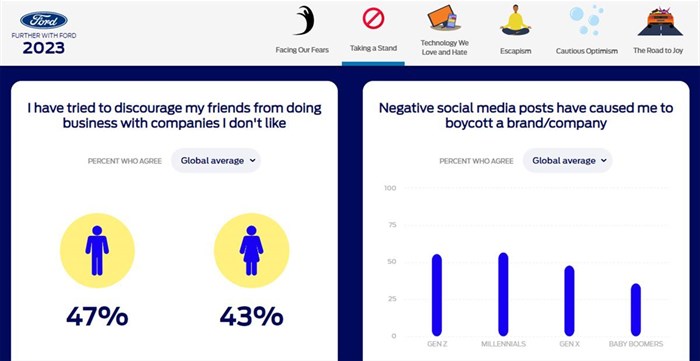#OrchidsandOnions: Ford just has the juice

Clever PR people particularly realised a while ago the truth in the saying that “There are three kinds of journalists – those who can count and those who can’t”…. and because of this, anything with numbers (percentages especially) will, in most cases, get put on a newspaper page or on a website word-for-word as it left the PR company’s email.
Research builds brands
Exponents of this are all over the place – but the “brand” (if you can call it that) which it so well was the sleazy dating site called Ashley Madison. To get free ink in gormless and sex-obsessed South Africa, they would put out releases proclaiming that the randiest people in the country came from Kuruman (or some such a platteland dorpie) and then ran the alleged figures (always in percentages). Because the sleaze was too difficult to resist (it’s sex, bru, and sex sells), few ever questioned the Ashley Madison releases.
On the paper I was running at the time, I banned the releases from getting near our pages, for which I was looked upon as a strait-laced puritan.
Yet, done properly, and ethically, research can be used by brands not only to build their own images (and therefore, eventually, in theory, their customer bases) but also to help people learn more about the others around them and around the globe.
That’s why I have always been taken by Ford’s annual Trends reports.
You’d expect these, being from a car-making giant, to focus on its cutting-edge technology and how it sees the future of automotive engineering. Indeed, that is what some major car brands do. But Ford’s approach has always been different because it looks at the broader concerns of society. That, of course, is critically important to any company trying to forecast the future and, even for a car maker, its futurologists have to know what drives people emotionally and psychologically.

The introduction to the report says: “Today, the top sources of stress include national and global instability, and personal finances. After three years of a global pandemic, how much longer can the world weather this protracted state of uncertainty? 68% of adults reveal they are overwhelmed by all the changes they see taking place in the world.
“With most people believing the worst is yet to come, consumers are taking stock of their fears, shifting accountability, reconsidering their reliance on tech, practicing escapism, and cautiously leaning into optimism while searching for inspiration and joy.”
The group’s researchers questioned more than 16,000 people (not only customers, either) in the 14 markets around the world where Ford is a major player. South Africa is one of those markets. Much of the research looks at issues a million miles away from cars and includes real key issues such as personal fears and hopes, trust in governments and media and the things people are prepared to throw their energy behind. At the same time, there are explorations of how people escape and how they find personal and societal joy.
The findings are categorised according to gender and according to demographics, from Baby Boomers to Generation Z. It is fascinating to look at how we compare, here in South Africa, to other markets as well as looking at how attitudes vary across the age spectrum…and not always in the ways you might have predicted.
As expected, though, South Africans are among some of the most pessimistic people in the world.
Naturally, one would expect people in other markets to be comparing their attitudes with those elsewhere… and here is the subtle genius of the report’s design shining through: These people are all, tacitly at least, acknowledging that Ford the brand has brought them together, helped them to understand the differences and similarities in global citizens. Effectively: Welcome to the Ford family.
It’s nuanced, but it is highly effective because the brand remains in the background, facilitating the transfer of interesting, sometimes important, information. And none of its competitors is doing this in quite the same way, which positions Ford as a global marketing innovator.
And that will win an Orchid from me all day long.
Tighten up the brand chain
They used to say that when you have a good experience with a brand, you tell three people and when you have a bad experience, you tell 12. That was before social media…and anger and fault-finding these days can spread virally in minutes.
That’s why if your brand is on social media and that is one of the channels on which you allow people to vent their feelings, then you better have professionals at all parts of the chain, especially if you’re using a platform as a customer service platform.
Nedbank has been getting it so wrong all over Twitter for more than a week now, as it has tried to deal with an angry customer, Caroline Hurry, who happens to be a friend and colleague of mine.
Even if she wasn’t though, I would be appalled that, after a week, the bank has still not managed to sort out the fact that her husband has been unable to use his business debit card on an overseas trip, despite him have done all the required activation before he left South Africa.
The man has been terribly embarrassed as pay points rejected his card as “not authorised” and he has had to survive on help from colleagues overseas. This is something that could, and should, have been sorted out within hours at the most. Had that been done, Hurry and her hubby would have been glowing in the praise for the bank.
But as the sordid mess dragged on, in typical social media fashion, people “piled on”, sharing their Nedbank horror stories. I would imagine most of those reading the posts would have serious doubts about giving Nedbank their business.
If you don’t care about your customers in their hour of need, Nedbank, then what good are you? You get a festering Onion from me.



























